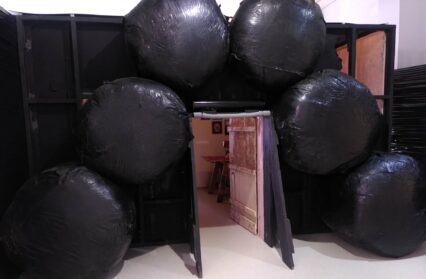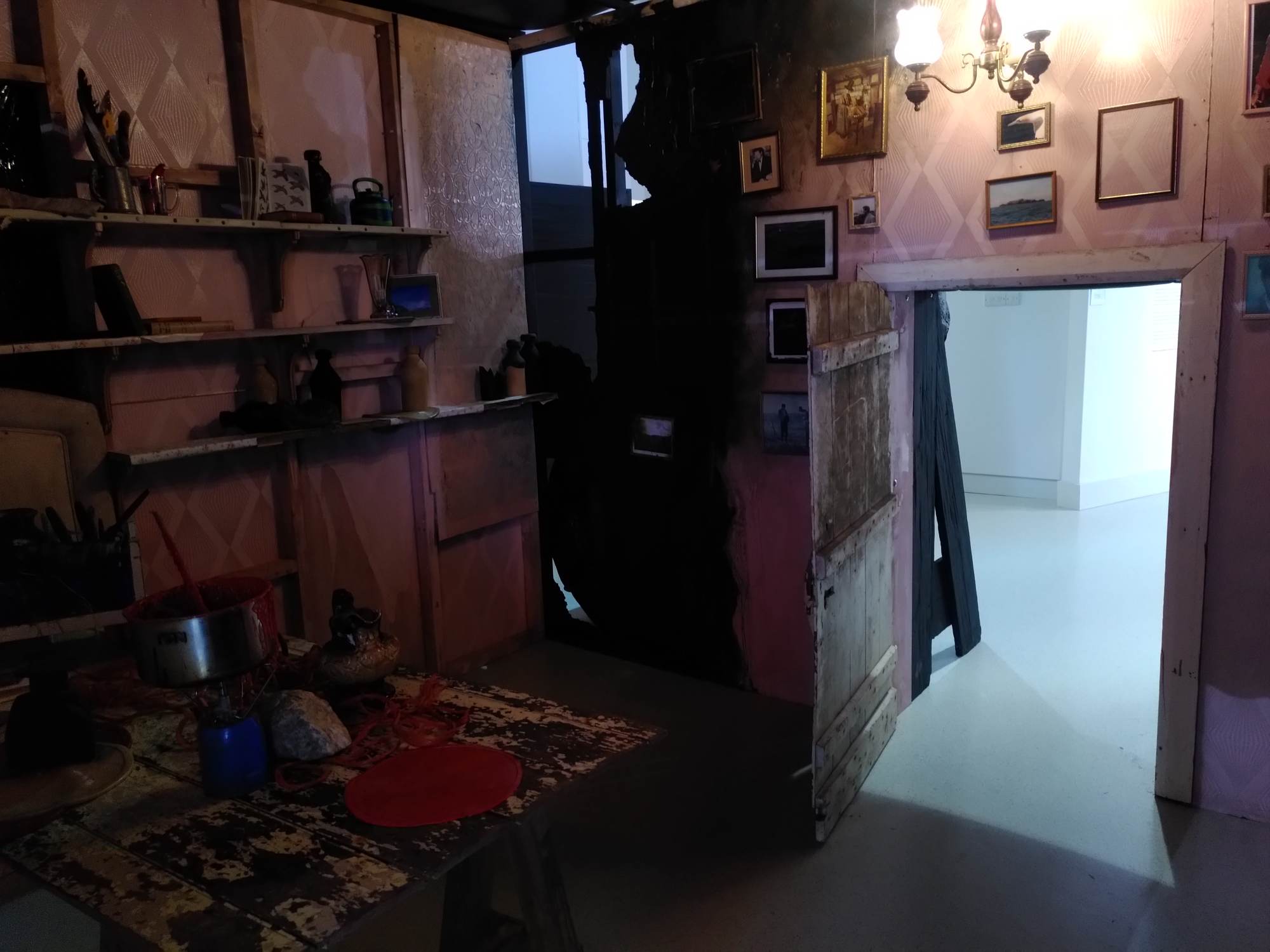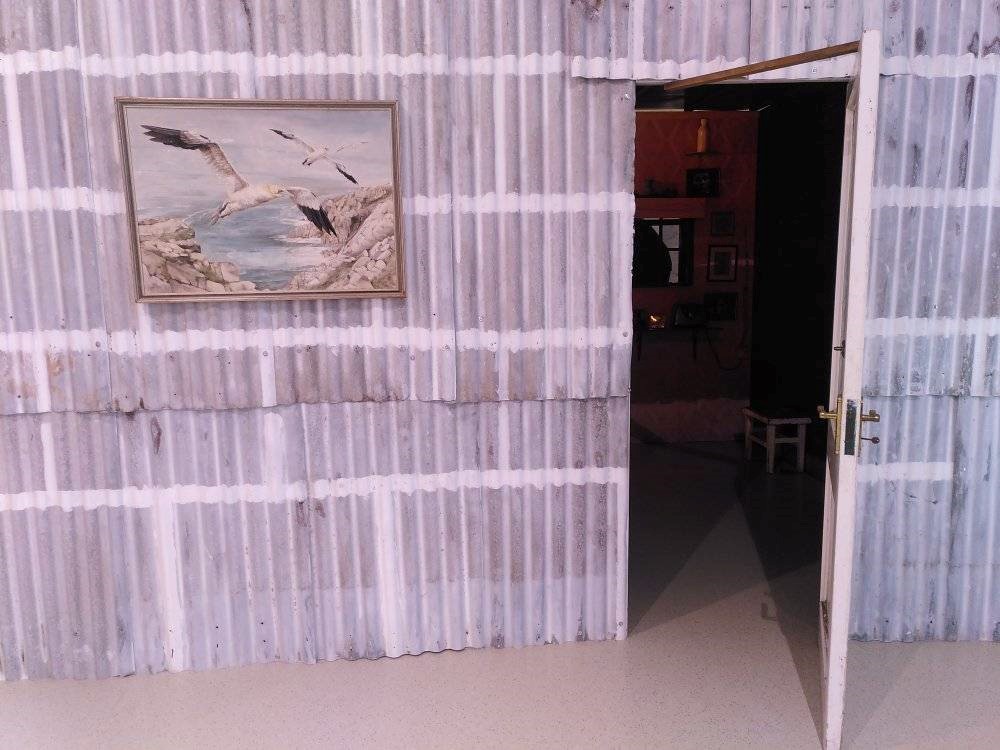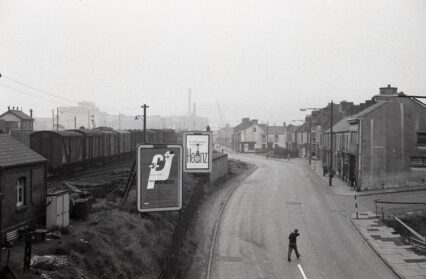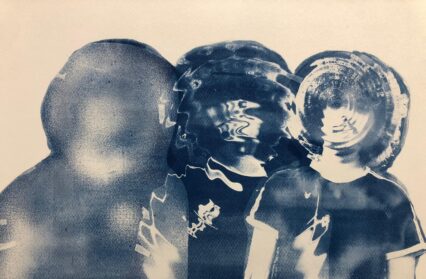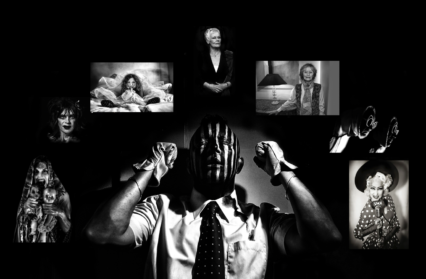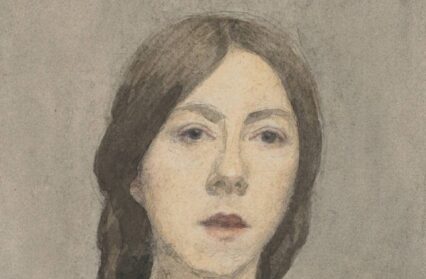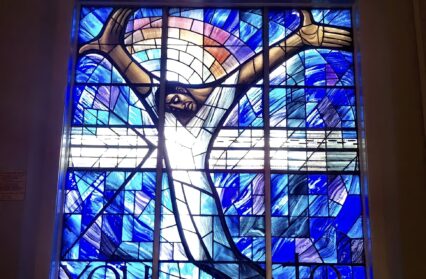Amy Grandvoinet reflects on the opening night of Ben Lloyd’s Gwales exhibition at the Arts Centre in Aberystwyth and chats with Ben to find out more about how Mabinogion and Thomas Moore’s Utopia inspired his work.
It was a hot, balmy September night at the Arts Centre in Aberystwyth. The concrete steps of its brutalist blocks were seeped in sunset, seagulls’ and butterflies’ silhouettes flitted like bats, and wine waited on tables upstairs in Gallery 2. Ben Lloyd was about to speak on his exhibition, Gwales. In a lazy hazy blissful buzz, attendees gathered round to listen in. Everything felt kind of dreamy.
Ben’s installation – a black silage-bale house, a 9-minute film, and a little paper pamphlet – imagines a utopian island. That island is Gwales (pronounced ‘Gwah-lehs’) from the thirteenth-century Mabinogi story ‘The Assembly of the Wondrous Head’. In ‘The Assembly of the Wondrous Head’, a group of comrades, guided by the severed talking head of Bendigeidran, escape the political tribulations of their usual existence to a distant palace of gleaming white marble across calm open seas. Here, they thrive in safety for eighty full years, happy and unbothered, but totally isolated. At the end of the myth, a forbidden door is opened and all host of complex realities come flooding back in. A utopian Gwales is revealed as a fragile ephemera; it could never last, and indeed it collapses.
Ben’s take on Gwales figures the Mabinogi’s émigrés as present-day Welsh citizens striving to save the scraps of their culture, at that same island refuge once more. Priced out of their homes by neoliberalist forces, they flee landscapes bereaved by gentrification and hollowed into holiday-making money machines for the rich. It’s a phenomenon happening globe-over, but Wales feels it keenly.
The twenty-first-century comrades bricolage their black silage-bale house from the relics of a disappearing pre-1970s world. Upon geometric pink-glitter wall-papered walls are hung metallic-etched oval-framed birds, small paintings of rural pastorals, Shirley Bassey and Tom Jones in portrait, Dylan Thomas too, the photographed ocean, and drawings of ladies in het Gymreig. Upon old wooden shelves are placed rock lumps (marble?), cornucopian vases, goblets of feathers, lightbulbs and key-sets, a rusting toaster, polypropylene string, and mysteries further. Rose-tinted lamps light the fictional room. Above the front door, a still-shot of beloved Gwales from Ben’s 9-minute film reminds the black silage-bale house dwellers to worship their fortunate sanctum. Lying on a peeling table is the little paper pamphlet, itself titled Gwales, chronicling the fantasy the exiles live by.
Ben’s utopia is certainly complex. As we meet and converse before his speech begins – which won’t be a speech but convivial discussion – Ben reveals his thoughts on utopian tensions. Utopias beguile, but are often full of problems and dysmorphic delusions. Gwales, he says, is thought to hold that palace-house of gleaming white marble, but it only gleams white because it’s covered in gannet-shit. Gwales’s rendition is in turn made of rot and black plastic. Ben and I discuss the usually-humorous quality of history’s best utopias – the eponymous island in sixteenth-century heretic Thomas Moore’s Utopia, for example. Decent utopias may suggest something towards better futures, with a healthy wink that knows their own fallibility too. Addressing the event’s attendees, Ben recounted a recent exchange with Mererid Hopwood on the meaning of the Gwales tale. Her conclusion: ‘we cannot live in oblivion and pretend all is well but must look and see and act’. Realistic connection is encouraged.
Hearty chat ensued between our mélange, athwart many generations currently inhabiting these post-devolutionary lands. Past remembered and present marked, forward was visioned. Amid moving anecdotes came feelings of tears and feelings of laughter. It was an occasion most genial. I asked Ben via email (he lives with his family in St Davids) for a few reflections on that balmy-night’s meeting.
Amy: Ben, diolch yn fawr for your non-speech speech at your Gwales in Aberystwyth. It opened a space for friends and non-acquainted alike to consider serious matters of cultural and economic precarity in Wales today. Was there anything that particularly struck you about the dialogue that unfolded?
Ben: What always strikes me about art is its ability to engender very real and heart-felt discussion from people who walked into the show as strangers. I also got the feeling that that diverse group of people still have hope and feel that there is salvation from an over-commercialised illusory world.
Amy: Yes. The occasion felt a little bit like a party. Seamus Fogarty’s soundtrack in Gwales’s 9-minute film is already psychedelic excellence, but if you could make a five-song playlist for a jamboree in the black silage-bale house, what desert-island utopian tracks might you include, and why?
Ben: I’m not sure on a playlist, but ‘Ebrill y Briallu’ by Ruth Barker would be automatically played over a PA once a day to make sure no-one forgets the beauty of the Welsh language. I’ve got it on vinyl but believe it’s also on YouTube, look it up you will not be disappointed!
Amy: The Mabinogi’s Gwales paradise presents a truly fascinating fable, and Meredydd Barker’s written version of it in Gwales’s little paper pamphlet is hypnotic. Are there any other utopian fables, island-based or otherwise, you might recommend to all the realistic dreamers out there?
Ben: Whilst there are hundreds of utopian texts spanning over four-thousand years, I think that these realistic dreamers would have to read Thomas More’s Utopia. At over five-hundred years old it’s well placed to get one started on how society has been working with utopian thought over the centuries. It’s great for technical detail of social structures common in utopian literature and all said with an elegantly arched eyebrow. Perhaps then expand your mind sideways with Ursula Le Guin’s brilliant The Dispossessed. And to make sure you don’t constrain your utopias to far off islands or distant planets, read Aaron Bastani’s Fully Automated Luxury Communism.
Amy: Can you tell Wales Arts Review any special news about any upcoming or ongoing work?!
Ben: I’m really pleased and excited to say that the Arts Council of Wales have supported my new project ‘The Utopian Impulse’, so watch this space!
Making moments to muse on matters like those explored in Gwales can be magic. Please read Ben’s earlier remarks on his latest exhibition, Gwales, and its coming-into-being in his article ‘Second Homes and a Forbidden Door’ in Planet Magazine: The Welsh Internationalist’s Issue 243, and you can follow Ben’s work’s most recent manifestations by visiting his website.
Ben Lloyd’s Gwales will be on show in Gallery 2 at the Arts Centre in Aberystwyth until 15th October 2023, and is generously supported by the Arts Council of Wales.


